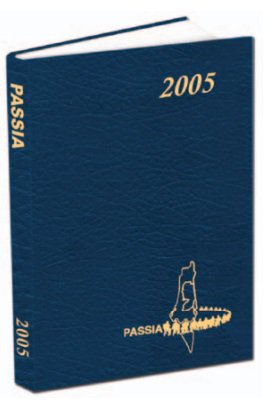PASSIA Diary 2005
Every year since 1988, PASSIA has published its "Diary", which continues to follow its original aims and goals, i.e., to provide a comprehensive directory of contact information for relevant organizations operating in the West Bank and Gaza – listing names, addresses, main activities – combined with a full day-to-day planner (calendar) of the respective year and a comprehensive compilation of events and statistics related to Palestine and the Palestinians.
The PASSIA Desk Diary is annually updated – entries are added, changed or removed and new addresses and information are included. PASSIA is very proud to say that its diary has become an invaluable source of information for many people, both locally and abroad, and as yet there is no equivalent publication in Palestine.
Overview
The 2005 edition of the PASSIA Desk Diary contains over 370 pages of updated and new addresses, a comprehensive , and information and statistics on relevant events and issues, as they became available throughout the year of 2004. The first section is the Directory, which contains details of Palestinian and international institutions operating in the Palestinian Territories. The fact that it is annually updated as well as the comprehensiveness of the directory is unique and makes it an invaluable resource for all those interested in or working on the Palestine Question. Among the information provided one finds names of contact persons, phone and fax numbers, email
and mailing addresses, internet websites (where available), and a brief background for most organizations on their main fields of work. The directory also includes an index that facilitates the search for a certain entry.
Directory entries in the 2005 edition included the following:
PLO Bodies, Departments, and Representation Abroad
Palestinian Authority (PA) Ministries and other Institutions, Commissions and
Councils
Palestinian Legislative Council (PLC)
members and committees
Police and Security (PA)
Local Government (Governorates,
Municipalities & Village Councils)
Political Parties and Factions
Academic and Research Centers
Agriculture
Associations & Unions
Chambers of Commerce
Charitable Organizations
Cultural Centers
Democracy, Peace & Community
Development Centers
Diplomatic Missions
Education (Universities, Colleges, Schools, Training Centers, Educational Institutes, and
Libraries)
Environment & Water
Financial & Development Institutions (Banks, Credit, Investment & Consulting Companies, Money Changers)
Governmental Aid Missions
Health (Hospitals, Clinics & Centers, Physicians, Pharmacies)
Human Rights & Law (Human Rights Centers, Law Offices, Lawyers)
International & UN Organizations
Local and Foreign Media & Press
NGOs Operating in Palestine
Palestinian Organizations in Israel
Religious Forums & Centers
Services (Accountants, Advertisement, Print & Design, Bookshops & Stationary, Car Rentals, Computers, Couriers & Express Services, E-mail & Internet, Insurances, Management Consulting & Development, Planning & Engineering, Real Estate, Restaurants, Telecommunication & Office Equipment, Translation & Editing)
Trade - Import/Export
Travel and Tourism (Airlines, Hotels & Resorts, Hospices & Guesthouses, Travel
Agencies & Tour Operators, Taxis & Transportati
Women’s Organizations
Youth Organizations and Sport Clubs
The second section of the Diary 2005 includes standard features, such as a day-by day planner, calendars for the previous and following years, address and note space, and anniversaries and national holidays of foreign countries. Each calendar page also includes a box providing details of international treaties, conventions, resolutions and so forth that relate to the Palestine Question.
The third section of the Diary is the Agenda, a source of information and facts about Palestine and the Palestinians. The agenda begins with 14 chapters in which the following aspects of Palestinian society and the Palestine Question are described, supported by tables, statistics and suggestions for further research (reading material and website references:
Dictionary of Palestinian Political Terms
Geography
Population
Refugees
Land & Settlements
Water & Environment
Economy (Agriculture, Industry & Private Sector, Labor & Employment, Tourism, Trade, Taxation, Finances)
Education
Health
Infrastructure (Housing & Construction, Transport & Roads, Telecommunication, Electricity & Energy)
Society & Living Conditions
Government & Negotiations
Jerusalem (facts & figures on the history,
population, Israeli policies and practices, settlement, and housing, as well as a chronology
of events in Jerusalem throughout 2004).
The fourth and final part of the agenda comprises, a Palestine Chronology 2004, full list of PASSIA publications, as well as a set of colored maps, illustrating historical and contemporary aspects of the Palestine Israel conflict, including maps on Israel’s settlement policy and its the separation wall, the distribution of refugees and the situation in Jerusalem.

